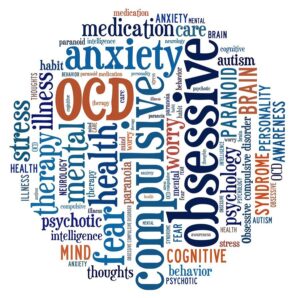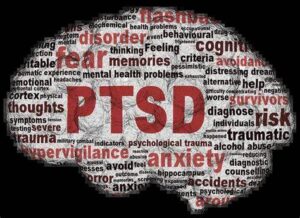Many people in the blue-collar work world do not want to hear the words “mental health”. This elicits thoughts of someone being weak, strange, or even someone faking a problem. The blue-collar work world is centered around a lot of physical labor and is overwhelmingly male (over 90%). The combination of men and physical labor increases the stigma of appearing weak, whether physical or mental. Obviously, there are a large number of women in this work force, and this does not in any way lessen their importance in the inclusion of mental health issues. Nor are women immune from the pressure of wanting to appear anything less than fully capable.
Given the desire to appear totally ready to work, someone being considered less than fully capable due to a physical issue is bad enough. Being considered less than totally capable due to a mental problem is even worse. No one wants to be put in the category of being considered weak due to mental issues! The unfortunate reality is that mental health is a real problem in the blue-collar world, just as much as anywhere else. It just tends to be hidden or ignored much more. However, mental health is equally important for everyone.
Mental Health can be categorized in two areas: Mental Health itself, and Mental Health Conditions. Everyone has “mental health”. Many of us have “good mental health”, a state of well-being that allows people to live their lives fully. Anything that affects living our lives fully can often be caused by struggles with mental health. Good mental health is not simply the absence of a mental health condition, it is also about the presence of well-being and the ability to thrive. Some difficulties with mental health can be caused by burnout, grief, fatigue, mental exhaustion, stress, and physical health conditions. These can often be short-lived and can be dealt with through rest, management of time, counseling, and sometimes medical management. Please note that these are temporary struggles with mental health issues. Everyone has them!
 A Mental Health Condition or disorder is considered a type of disease, similar to cancer, pneumonia, heart conditions, MS, or Parkinson’s. Mental Health Conditions need to be seen as important as any other disease. You would not tell someone to “just deal with it” or “suck it up” to someone with emphysema, or “just think positively” or “it’s just in your head” if they had a cancer, or someone with high blood pressure “just don’t get stressed” would you? Neither should we consider any mental health disorder as something that should be handled in that manner. Additionally, any use of mental health medications should be seen as the same as any medication used to treat a condition, I.E. antibiotics or high blood pressure medications.
A Mental Health Condition or disorder is considered a type of disease, similar to cancer, pneumonia, heart conditions, MS, or Parkinson’s. Mental Health Conditions need to be seen as important as any other disease. You would not tell someone to “just deal with it” or “suck it up” to someone with emphysema, or “just think positively” or “it’s just in your head” if they had a cancer, or someone with high blood pressure “just don’t get stressed” would you? Neither should we consider any mental health disorder as something that should be handled in that manner. Additionally, any use of mental health medications should be seen as the same as any medication used to treat a condition, I.E. antibiotics or high blood pressure medications.
Having a mental health disease can be a very real issue and should never be discounted as being “faked” by someone or occurring only in “weak” people. The reality is our brains are run by many complex operations on the chemical and electrical scale. Anything that disrupts these chemical or electrical signals can cause mental health disease. This is usually not caused by a person’s choice or actions. Someone who has a mental illness does not choose this and it is not their “fault”. Usually, it is also something that they have little or no control over. The most common mental illnesses include anxiety, depression, bipolar, PTSD, (post-traumatic stress disorder) and OCD (obsessive compulsive disorder.) This is by no means an exhaustive list.

The causes of Mental Health Conditions are varied:
- Biological or being born with it: OCD, bipolar, sometimes anxiety
- Life circumstances: PTSD, anxiety, insomnia
- Physical health changes: diseases like a heart condition or cancer, exposure to toxic substances, traumatic brain injuries, poor nutrition, or hormonal changes such as post-partum depression for a woman.
Unfortunately, many mental health terms are commonly either discounted or thrown about as buzz words. Here are some common uses of these terms:
- “I have anxiety because I am stressed about losing my job”.
- “Ahh, he’s just depressed because he lost his girlfriend.”
- “I’m bipolar! I tend to have mood swings!”
- “I had a nightmare about something last night. It must be PTSD.”
- “I’m OCD! I tend to be very picky about how clean things are.”
- “That was scary and stressful. I must have had a panic attack.”
We’ve all heard these terms thrown about like this! However, it is very important to realize that there is a difference between a real actual mental health condition and something like a feeling you get for a short period of time or just a part of your personality (for instance, you are picky about cleanliness or you are depressed because of a loss). However, to throw these terms around lightly is a disservice to those who actually struggle with the real condition. It is no joke when someone (or yourself) has a real condition like depression, OCD, anxiety, or PTSD. These are all very real mental health conditions that can and are diagnosed as a disease.

A good example would be my youngest daughter. She was in a serious car accident several years ago. She was sitting in a proper turn lane, with her blinker on, waiting for clear traffic to turn left into a store. A pickup truck driving the other way drifted into her lane (he had fallen asleep) and struck her car head on. Fortunately the driver woke up and corrected in the last second to avoid hitting full head on, instead hitting the driver’s side front so his truck rode up and over her front hood and then flipped onto its side. It was very fortunate that it was not a full head on collision.
She was not seriously physically hurt in the accident, with a sore chest from the seat belt and a sore ankle from the impact as well as a concussion. However, the emotional damage is definitely genuine. She still has very real anxiety and sometimes paralyzing fear when different situations occur that are like her accident, such as turning left across traffic, or even seeing black trucks similar to the one causing her accident. This is an actual case of PTSD, where her fear and anxiety are triggered by situations like her accident. It can be exceedingly difficult for her to hear people joke about PTSD since she struggles with the very real effects of that condition.
The level of seriousness of a situation or event does not always mean that a person will develop a condition. Many people have been in accidents with no mental or emotional side effects. Someone bitten by a dog might not have PTSD where someone else with the same bite might develop it. Many veterans have been diagnosed with “non-combat PTSD” which is as real as combat-induced PTSD. All of us can react in a unique way too many situations. The level of seriousness of a condition also does not depend on whether a person is mentally or emotionally “tough” enough.
Another important consideration in workers with a mental health condition is the reality of the amount of energy it can take to be able to function normally. A person without a mental health condition can complete tasks and will be tired as any typical worker. However, a worker who has a mental health condition will be twice as likely to be totally exhausted. The amount of energy required is almost always much higher for this person. Being able to just work or be part of society can take an enormous amount of energy for someone with a mental health condition. This is something someone with a mental health condition usually cannot see or understand. It is very important to keep this in mind when a co-worker or employee has a mental health condition.
We can see that mental health is a very complex and very real issue. It must be taken seriously by employers and fellow workers. Do not make assumptions about someone’s mental health, regardless of whether or not it seems unlikely for them to have a mental health condition. Please encourage someone who is struggling with a mental health condition to seek professional help.
.
With all this discussion of mental health, it is important to realize that all of mental health, whether good or bad, disease or not, are only parts of who we are. They do not define us. We are creations of a loving, caring, and holy God. He made us in His image.
Even though we are born in His image, we still choose to do wrong in ourselves or “sin”. Sin is caused by our own choice of doing wrong. We make ourselves less than perfect. This choice of sin separates us from God, creating a chasm between us and a holy and perfect God. The very nature of God means he cannot have anything less than perfection in his presence. Man tries to earn his way into heaven thinking if he does enough good works it’ll add up to be enough. The imperfection of our sin is enough to separate us from God. Just going to church and trying to be a good person does not cross that gap.
The good news is we have a way to bridge that chasm! God’s son Jesus was born here on this earth with the same option to choose to sin or not sin. However, he chose to not commit sins, to not disobey or defy his father. This means he was perfect and could have simply entered the presence of God.
However, he chose to sacrifice himself to pay for our sins! He built the bridge that brings us to the presence of a Holy God. God loved us so much He sent his perfect son to us on earth to provide a way to Him. John 3:16 provides us with the key: “For God so loved the world, that He gave his only Son, that whoever believes in him should not perish but have eternal life”.
Believing in God and His son Jesus will not solve all of our problems here on earth, whether they be physical or mental. But our life with Him, eternal life, will be perfect, with no diseases, illness, aches, pains, or sadness. Choosing Him is all it takes!
To learn more about this all-important choice, I’d encourage you to look to the Bible, specifically John 3:16 and Romans 3:23, Romans 6:23, and Romans 10:9. (the numbers mean chapter, then verse, as in the New Testament book of Romans, chapter 3, line number 23.)
